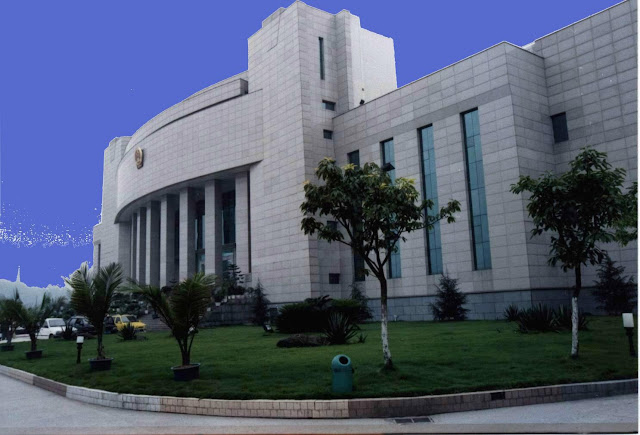 |
| Daheidong Cave in Luzhou, Sichuan, where the Southwest Buddha League was headquartered in 1996. Image credit: Sogou |
The criminal acts of armed rebellion (武装叛乱) and armed rioting (武装暴乱), defined in Article 104 of the Criminal Law, are among the least understood crimes of endangering state security (ESS). They are also among the least frequently invoked in the country. Statistics published by the 12-volume Records of People’s Courts Historical Judicial Statistics: 1949-2016 indicated that Chinese courts only tried 11 cases involving 39 defendants in the 18 years beginning in 1998.
Trials of armed rebellion and rioting intermittently took place in 1999, 2001-2003, 2006, 2008, 2011-2012, and 2015. The largest case involved 24 defendants and was tried in 1999. Two years later, six people were tried in two separate cases. Only one to two people were tried each year in the remainder of the years.
Both armed rebellion and armed rioting are capital crimes that are punishable by death when cases are deemed to be particularly severe, but the acts are not identical. One key difference, according to Chinese legal practitioners and scholars, is that armed rebellion requires an intent to seek refuge with or assistance from an entity perceived by the Chinese government to be a hostile foreign organization. Armed rioting, however, occurs when a group of people take up weapons or use explosives as an act of resistance against the Chinese Communist Party without seeking assistance from abroad.
As public information about armed rebellion or armed rioting cases is almost non-existent, the defendants and their acts remain shrouded in secrecy. However, Dui Hua found evidence that these cases could be connected to an armed riot which broke out 24 years ago in Luzhou, Sichuan.
Luzhou, Sichuan
The 24 people convicted in 1999 were all sentenced in a closed trial in Luzhou, Sichuan. Official sentencing records report that they participated in an anti-government militia called the Southwest Buddha League (西南佛联盟). Guizhou native Chen Faqing (陈发清) founded the militia in Yongxu County, Sichuan, in the early 1990s. Chen allegedly aimed to overthrow the Communist regime and save the Chinese people from an apocalypse that he said would occur between 1997 and 2000. The militia issued its own work permits, organized an independent household registration system, and established more than 30 bureaucratic divisions and a military academy. At its peak, the Southwest Buddha League had 1,120 registered members, according to provincial records.
The militia attempted to stage an armed riot in April 1998 after two members were detained. On June 5, armed police surrounded the group’s stronghold in Daheidong Cave in Gulin County, detaining 48 core members and confiscating more than 400 pounds of explosives. The most lenient sentence in the case was three years in prison. However, Chen Faqing and three others were sentenced to death.
 |
| A photograph of Luzhou, Sichuan, from August 2008. Image credit: Philip / CC BY-SA 4.0 |
Another three were sentenced to 15 years’ imprisonment: two of them were released early while the third died in custody. In the early 2010s, Dui Hua inquired about the fate of two of the surviving members. Chen Yunhua (陈云华) was released on November 7, 2011, after receiving a 19-month sentence reduction. Zeng Xiangui (曾显桂) received four sentence reductions totaling 60 months between 2002 and 2008. Zeng was released on June 7, 2008.
More Trials in Luzhou
Dui Hua’s research has uncovered more armed rioting trials after the case of Southwest Buddha League was concluded in 1999. Coincidentally, all the trials took place in Luzhou. In April 2008, Liu Zhonglin (刘中林) received a 10-year prison sentence and a one-year supplemental sentence of deprivation of political rights. In 2012, his sentence was reduced by one year. In 2015, Sichuan’s Ya’an Prison recommended that an additional 18-month sentence reduction be given to Liu because he demonstrated diligence in prison labor. If the recommendation was approved, Liu would have completed his sentence early in June 2015.
An armed rioting trial as recently as 2019 was also concluded in Luzhou. The case involved three defendants: Li Guanghong (李光洪), Long Xianyao (龙先尧), and Wang Anhua (王安华). The judgment, which was published online on December 25, 2019, has since been removed amid the mass purge of court judgments beginning in June 2021. The specifics of the case are unclear because the contents of the judgment had not been disclosed. Precedent suggests that prison sentences for people convicted of armed rioting tend to be lengthier and more severe, and it is very likely that the three are serving their sentences somewhere in Sichuan.
 |
| Intermediate People's Court of Luzhou City, Sichuan Province. Image credit: Baike |
The 1998 incident in Luzhou took place at a time when the internet was at its infancy. It is the only armed riot known to have been documented online over the past two decades. It is difficult assess how truthful this official narrative is. Were there a recent outbreak of an armed riot, it is likely that some Chinese netizens would still have recorded and posted what they witnessed on blogging and messaging services.
Dui Hua could not find information about any other armed riots or rebellion beyond what happened in Luzhou in 1998. The fact that all three known trials of armed rioting cases occurred in the same place can hardly be a coincidence. It is possible that those tried in 2008 and 2019 took part in the same 1998 incident and eluded police for an extended period. ESS cases are by nature sensitive and are subject to low transparency. Unless the Chinese government publishes more information about these trials, the incident officially labeled “Luzhou armed riot” will join the ranks of other mysterious ESS cases about which extremely little is known.

